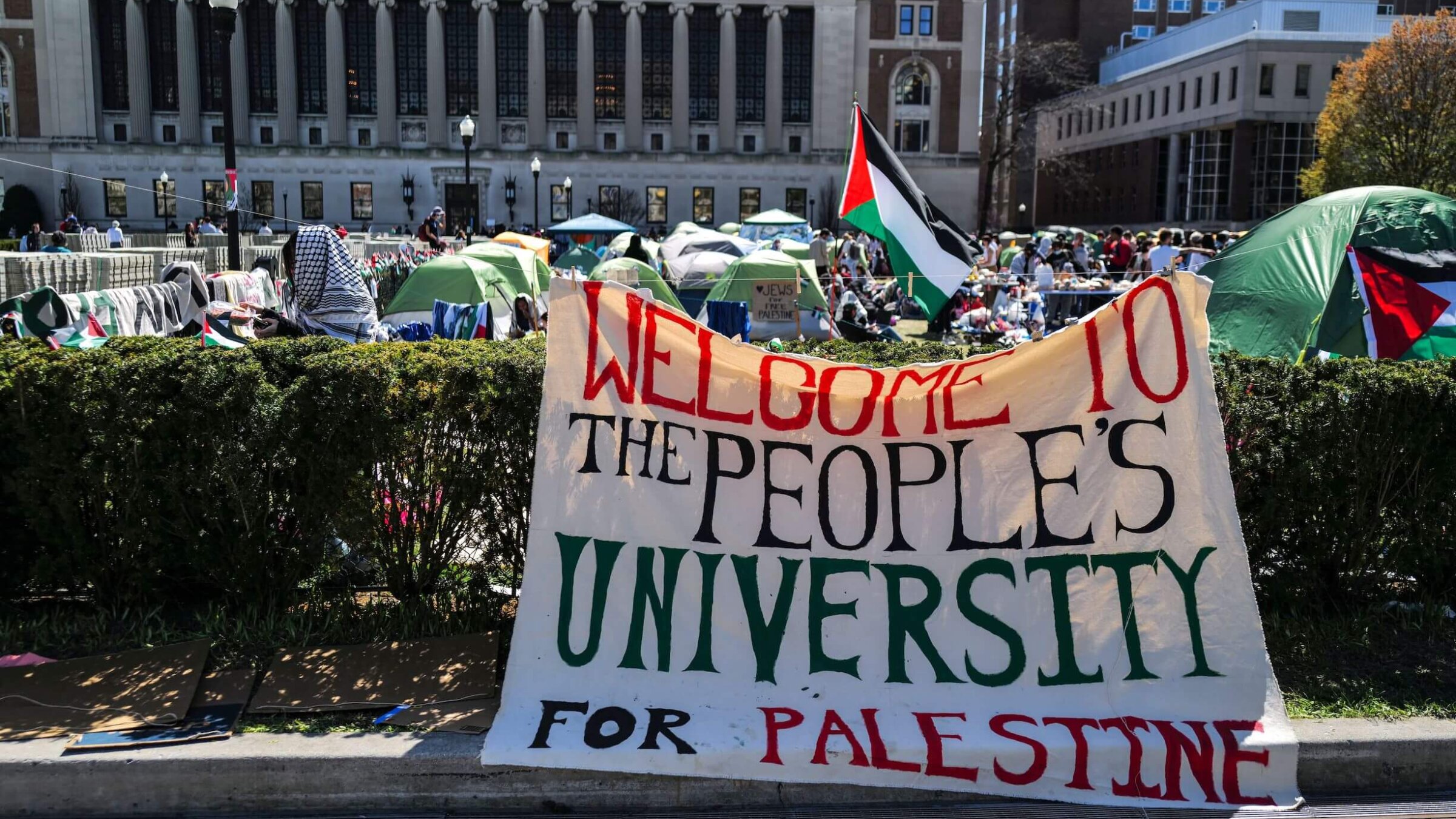‘Hazardous chemical’ spewed at a Columbia anti-Israel protest was actually novelty spray, school says
Students had claimed agitators used skunk water, a biochemical weapon used by the IDF

A pro-Palestinian encampment at Columbia University. Photo by Charly TRIBALLEAU / AFP
After Columbia University students in January accused pro-Israel agitators of spraying protesters with a toxic chemical developed by the IDF, the school and NYPD launched an investigation. One student described the smell as “a really strong smell of poop mixed with decaying animal.”
Seven months later, it’s clear that student’s understanding of the event was prescient: The severe foul odor — which 10 students told the school newspaper caused physical symptoms — was not a proprietary biochemical weapon or illicit substance, the school recently announced, but a “non-toxic, legal, novelty item that can be purchased online and in stores throughout the country.”
In other words, the school is saying it was something like fart spray.
Nearly two dozen students reported the stench following a Jan. 19 divestment rally on the steps to Low Library, a popular gathering place for Columbia and Barnard students. Students reported burning eyes, headaches and nausea to the student newspaper, the Columbia Spectator, which said three had sought medical attention after the spray was unleashed.
After reports of the odor surfaced, the local chapter of Council of American Islamic Relations demanded law enforcement investigate the incident as a possible hate crime.
A graduate student named Layla Saliba told the Spectator that following the incident, she visited an urgent care facility — where she said doctors diagnosed her with exposure to a harmful chemical and told her that she needed to miss class for a few days due to her severe pain.
Saliba, who is Palestinian American, was one of three students who claimed they recognized the smell as that of skunk water, a liquid chemical developed by an Israeli company and reportedly used by the IDF for crowd control in the West Bank. (The substance is also sometimes referred to simply as “Skunk.”)
After the protest, Columbia’s chapter of Students Supporting Israel spoke out against the use of the spray, condemning “any actions of any individuals who may engage in behaviors with the intent to cause physical or psychological harm to other Columbia students.”
It remains unclear who the men were or whether the school or NYPD’s investigations identified them. In January, Saliba posted on X an image of three men lingering at the protest, one of whom she alleged supplied the spray.
She remained unconvinced by the school’s findings Friday, saying the school was lying.
In an interview over direct message, Saliba said the NYPD had previously told her attorneys it was “law enforcement-grade chemicals” and added that she was still dealing with health issues related to the incident. She had not experienced skunk water previously, but said family members in the West Bank had.
“It was absolutely not fart spray,” she said, noting that a host of cleaning remedies failed to remove the odor. “I was throwing up for days and it made my clothes smell like raw sewage.”
Columbia University’s Department of Public Safety declined to answer questions Tuesday. The NYPD did not respond to a request for comment.
While skunk water has been marketed as an improvement over other crowd control weapons such as tear gas and rubber bullets, it remains controversial, and the IDF has drawn criticism for how it deploys the chemical. The Israeli human rights group B’Tselem has claimed the IDF frequently uses skunk water as “a form of collective punishment for a whole area.”
Odortec, the company that developed skunk water, also exports it to the United States, where several police departments have purchased it — including that of Ferguson, Missouri, which deployed it in the wake of the Michael Brown protests of 2015.
The school’s findings come as the fall semester gets underway at Columbia, and with it, a new wave of protests on the campus, perhaps the epicenter of the anti-Israel movement on college campuses since last Oct. 7.
On Tuesday, protesters dumped red paint on a statue overlooking the Low Library steps, and two pro-Palestinian protesters were arrested just outside the campus.
Correction: The article has been updated to reflect that Saliba is a Columbia University graduate student, not an undergraduate.






















